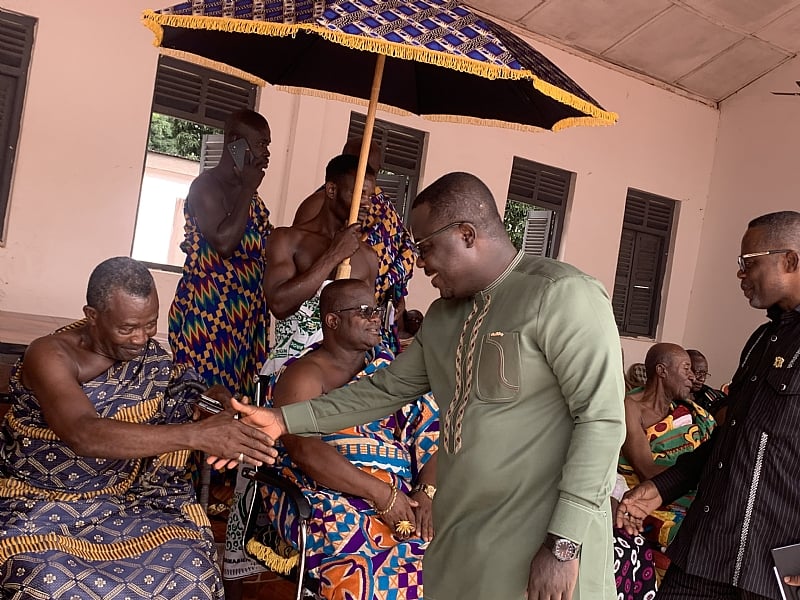The Bono Regional Minister, Mr. Joseph Addae Akwaboa, embarked on a regional familiarization tour, engaging with chiefs and residents to foster development, address local concerns, and strengthen government-community ties. His primary focus throughout the tour was the promotion of peace and unity, particularly in relation to chieftaincy disputes, which he identified as a major impediment to progress. He urged adherence to traditional customs and legal frameworks in resolving these disputes, emphasizing the detrimental impact of protracted conflicts on development initiatives. The Minister’s visits served as a platform to address critical issues, gather firsthand information on local needs, and reaffirm the government’s commitment to the region’s advancement.
A key concern raised by Mr. Akwaboa was the escalating security threat posed by chieftaincy disputes, specifically referencing flashpoints across the region including Sunyani, Berekum, Wenchi, Badu, Japekrom/Drobo, Fiapre, and Sampa. He stressed that these conflicts drain resources, disrupt social harmony, and undermine the region’s potential for growth. Therefore, he appealed to chiefs and kingmakers to prioritize peaceful resolutions and adherence to established procedures when selecting new chiefs. This emphasis on peaceful conflict resolution underscores the Minister’s commitment to creating a stable and conducive environment for development. His direct engagement with local communities highlights the importance of dialogue and collaboration in addressing sensitive issues like chieftaincy succession.
In addition to addressing conflict resolution, the Minister outlined several government interventions aimed at improving the lives of residents. He highlighted programs such as “No Stress Fees,” “Mahama Care,” and “Akoko Nkitikitin,” emphasizing their role in providing relief and creating employment opportunities. He also announced upcoming infrastructure projects, including the construction of the 36-kilometer Alaska outer ring road in Sunyani, as well as road improvements connecting Sunyani-Ntotroso, Kyeremasu-Gambia, and Dormaa-Nkrantwanta. Furthermore, he detailed plans to establish 24-hour economy market centres equipped with essential services such as police and fire stations, clinics, and schools. These announcements reflect the government’s commitment to investing in infrastructure and essential services to stimulate economic activity and improve the quality of life for citizens.
Taking a strong stance against illegal mining, Mr. Akwaboa warned those operating in areas like Amasu, Aboabo, Akwamu, Wamfie, and Kyeremansu to cease their activities or face arrest. He cautioned chiefs against intervening in such arrests, highlighting the severe environmental consequences of illegal mining, including deforestation, water pollution, and land degradation. This firm stance against illegal mining, popularly known as “galamsey,” demonstrates the government’s commitment to environmental protection and sustainable development. The Minister’s warning underscores the seriousness of the issue and the government’s resolve to combat the destructive practices associated with illegal mining.
During the Minister’s visit to the Dormaa Palace, he received appeals from local leaders regarding specific development needs in the area. Speaking on behalf of the Paramount Chief of Dormaa, Osagyefo Oseadeeyo Agyemang Badu II, Dormaa Twafohene and Kofiasuahene, Barimah Twumasi Bekoe, reminded the government of a previous pledge to establish a university in Dormaa, noting that land had already been allocated for this purpose. He also appealed for support in revitalizing the poultry sector to create job opportunities for the youth. These requests highlight the importance of local advocacy and the role of traditional leaders in communicating community needs to the government. The allocated land for the university project demonstrates the community’s proactive approach to development.
In essence, Mr. Akwaboa’s familiarization tour served as a multifaceted engagement, addressing crucial issues such as chieftaincy disputes, illegal mining, and local development needs. He emphasized the importance of peace and unity as prerequisites for progress and outlined various government initiatives designed to stimulate economic growth and improve the well-being of residents. His commitment to engaging directly with communities underscores the government’s focus on transparency, accountability, and responsive governance. The tour facilitated a vital exchange between local communities and the government, allowing for the conveyance of key concerns and the reaffirmation of the government’s commitment to addressing them. The Minister’s proactive approach demonstrates a commitment to collaborative governance and inclusive development.














